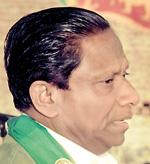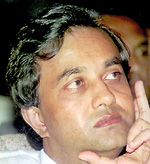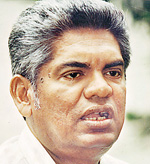Sunday Times 2
Aping the Americans
Being now in my seventies I am old enough to remember people like Ranasinghe Premadasa, Gamini Dissanayake, Lalith Athulathmudali, Lakshman Kadirgamar, Ranjan Wijeratne, C.V Gooneratne, Appapillai Amirthalingam and Mohamed Ashraf. These folk represented the crème de la crème of the political leadership of our country during the latter part of the twentieth century. Unfortunately they all met violent deaths almost certainly at the hands of the LTTE. With these political heavyweights being removed from the ranks of those who had the personality and potential to lead our country, we in 21st century Sri Lanka have now been left with the residue – the “also rans” – who have got into power through sheer default.



Ranasinghe Premadasa, Gamini Dissanayake and Lalith Athulathmudali, the crème de la crème of political leadership of our country, all met violent deaths almost certainly at the hands of the LTTE.
And now our new leaders – the President and Prime Minister from different political parties whom misery has converted into strange and barely compatible bedfellows – are falling over backwards to dance to the tune of the Americans.
Just take the example of our huge cabinet. In the latter part of the 20th century, when we had a unicameral legislature (a House of Representatives only with no Senate), all members of the cabinet had to be members of the parliament – in other words, only those who were elected by the people to serve as members of parliament could become Cabinet Ministers. If one was not a MP, one could not become a cabinet minister.
This is the same principle that is followed in other countries that have Westminster-style of democracy such as India, Australia, Canada, Malaysia and Britain. In America however, things are different.
In the US, the members of the Cabinet (who receive the title of Secretary rather than Amathi-thuma) are nominated by the President. These nominations are then presented to the US Senate where they have to be confirmed or rejected by a simple majority. If the people nominated by the president are approved, they are then sworn in and commence their duties – but if the nomination for whatever reason is rejected by the Senate, then the President has to accept the rejection and nominate someone else who the Senate will accept. Members of the Cabinet serve at the pleasure of the President, who may dismiss or reappoint them to other posts as he wishes.
This is how President Obama appointed people like our recent visitor John Kerry (who lost the 2004 presidential election to George W. Bush) as his Foreign Secretary and Arne Duncan, a non-politician who was Chief Executive Officer of Chicago’s public schools, as his Secretary of Education. All these US Secretaries (Ministers) are direct presidential appointments – which of course have to be approved by the Senate.
Here in Sri Lanka, we now have a similar system where Cabinet Ministers are appointed at the whim and fancy of the President. Since however they all have to be members of Parliament before they can be made Ministers, the President has adopted a typical yahapalanaya-subterfuge. If he wants to make a cabinet minister out of somebody who has not been elected to Parliament, he takes the simple and immoral step of appointing that person into Parliament – even if that candidate was a loser at the elections and was decisively rejected by the people at the polls!
This is how men like S.B.Dissanayake and Sarath Fonseka, convincingly defeated and rejected by the voters at the last general elections, have ended up as cabinet ministers.
The sad thing about our president’s Yahapalanaya-Pachapalanaya is that he has taken the worst aspect of the American system (making cabinet ministers out of those whom the people rejected at the polls) and left out the good part of the American system (where all nominations have to be approved by the legislature). Kaata kiyannade?

